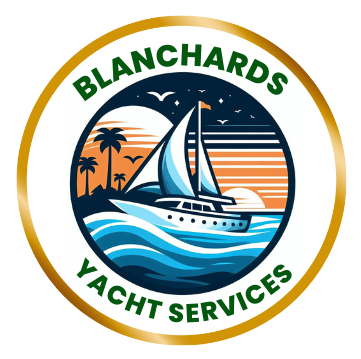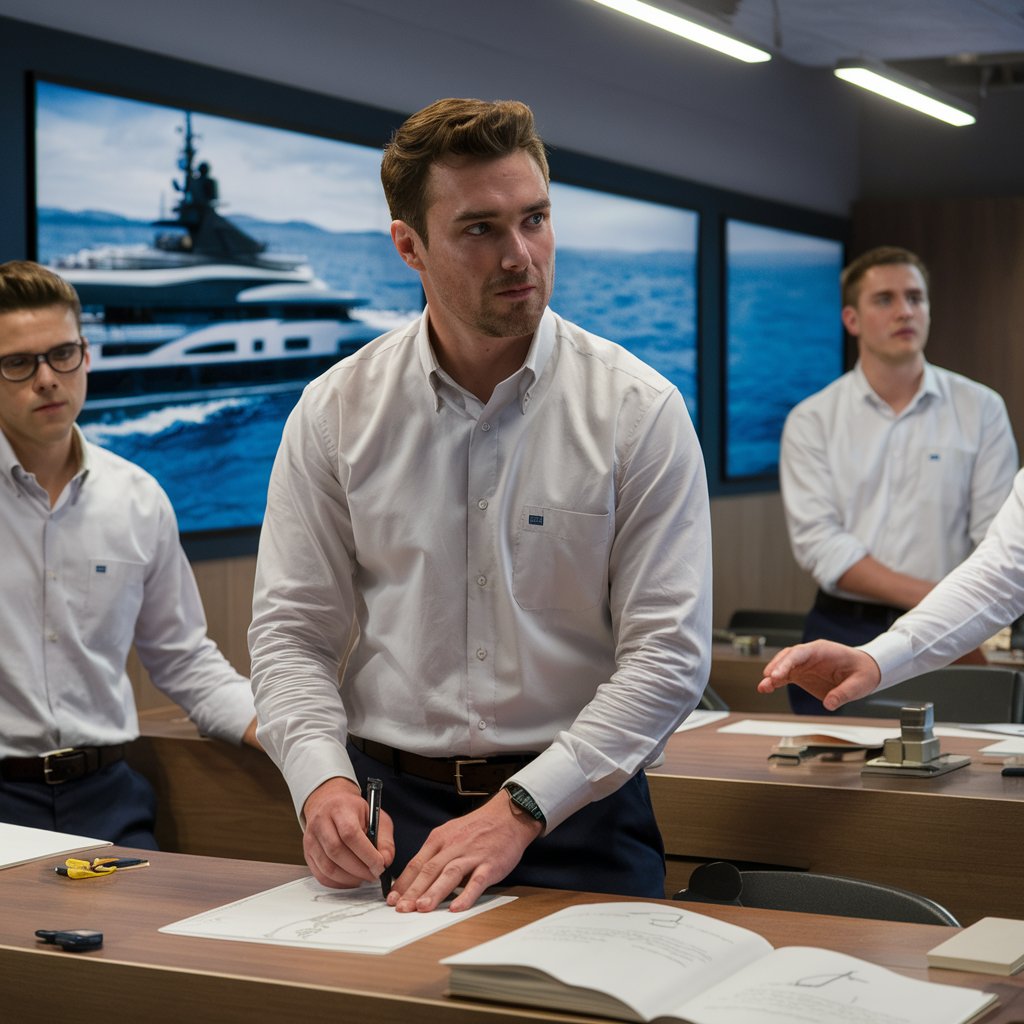Many yachting pundits would remember a time when knowledge in sailing and yachting was passed down like family heirlooms – precious and personal. Those early days had a charm of their own, where learning came from doing, and the sea was both the classroom and teacher. But things weren’t perfect.
Inconsistencies crept in as each sailor had a different set of skills, picked up through trial and error. As you can imagine, such discrepancies were far from ideal in an industry that thrives on precision and uniformity.
With the expansion of yachting, a pivotal moment emerged when it became evident that the yachting sector required a more structured and tangible approach to education. Key milestones included the introduction of standardized certifications – a game-changer that set out clear competencies for every role on board.

The ripple effect of certification was clear as daylight. Professionalism surged; it was as if the industry itself had straightened its collar and polished its shoes. Suddenly, there was a benchmark for skills and a structured pathway to acquiring them.
Now, let’s draw the contrast: The needs were straightforward, centered around survival and navigation. Fast forward to today, and the list includes sophisticated engineering know-how, unparalleled hospitality, safety systems, and often, a touch of flair.
Setting Sail into the Future: Modern Training for Yachting Excellence
Today’s yachting industry demands not just experience, but also precision and a refined skill set. The rise of state-of-the-art training facilities reflects this unyielding pursuit of excellence. Students don’t just learn; they’re immersed in environments that simulate real-life scenarios. Simulators and Virtual Reality create a safe yet potent training ground, sharpening reactions and deepening understanding.
A search for premier yachting education would reveal a few establishments that consistently raise the bar. These haven’t just produced adept professionals; they’ve led the wave of transformation in yachting education.
Essential Certifications and Training Programs
STCW (Standards of Training, Certification, and Watchkeeping)
- Overview: The STCW certification is a mandatory qualification for all yacht crew members. It covers essential safety training, including firefighting, first aid, and survival at sea. This certification is crucial for anyone looking to work on commercial yachts or large pleasure vessels.
RYA (Royal Yachting Association)
- Overview: The RYA offers a range of qualifications and courses for yacht crew members, from basic dinghy sailing to advanced yachtmaster qualifications. The RYA’s programs are internationally recognized and highly respected within the industry. Key certifications include the RYA Day Skipper, RYA Coastal Skipper, and RYA Yachtmaster.
ENG1 (Seafarer Medical Certificate)
- Overview: The ENG1 certificate is a medical examination required for all professional yacht crew members. It ensures that crew members are in good health and fit to perform their duties at sea. This certificate is essential for anyone working on commercial yachts and is recognized globally.
Yachtmaster Certification
- Overview: The Yachtmaster certification, offered by organizations like the RYA, is a prestigious qualification that demonstrates advanced navigational and seamanship skills. There are several levels, including Yachtmaster Coastal, Yachtmaster Offshore, and Yachtmaster Ocean, each requiring different levels of experience and proficiency.

Maritime Academies and Specialized Programs
- Warsash Maritime Academy (UK)
- Location: Southampton, England
- Overview: Warsash Maritime Academy offers a comprehensive range of courses, including STCW training, Yachtmaster preparations, and advanced maritime studies. Their programs are designed to equip students with practical skills and theoretical knowledge essential for modern yachting.
- Bluewater Yachting (France)
- Location: Antibes, France
- Overview: Bluewater Yachting provides a full spectrum of yacht crew training, including STCW certification, Yachtmaster courses, and specialized training in luxury yacht service. Their state-of-the-art facilities and expert instructors ensure top-notch education for aspiring yacht professionals.
- International Yacht Training (IYT) (Worldwide)
- Locations: Multiple global locations
- Overview: IYT offers internationally recognized certifications, including the IYT Master of Yachts and STCW courses. Their programs cater to both recreational and professional sailors, providing a thorough education in yachting and maritime skills.
- The Crew Academy (Monaco)
- Location: Monaco
- Overview: The Crew Academy focuses on high-end yacht crew training, including STCW certification and luxury service training. Their courses are tailored to meet the demands of the superyacht industry, emphasizing impeccable service and professionalism.
- Australian Maritime College (AMC) (Australia)
- Location: Launceston, Tasmania, Australia
- Overview: AMC offers specialized training for yacht crews and captains, including STCW certification and advanced maritime courses. Their programs are well-regarded for their comprehensive approach and hands-on training.
Continuous professional development isn’t just recommended; it’s paramount. The seas of regulation and technology are forever changing, and staying afloat means keeping pace. Advanced courses ensure seasoned veterans remain at the helm, steering their careers with confidence and up-to-date knowledge.

The luxury yachting experience now hinges on a crew’s expertise. It’s why the relentless focus on training equates to a superior on-the-water experience for discerning clients. Training schools are the unsung heroes here, forging paths for the crew that make those memorable voyages possible.
How Long is Yachting School?
The duration of yachting school varies depending on the specific courses and certifications being pursued. For basic entry-level certifications like the STCW, the course typically lasts about one to two weeks. This essential training covers basic safety protocols, first aid, firefighting, and survival techniques, providing the foundational skills required for all yacht crew members. Similarly, the ENG1 medical certificate, which is a short medical examination, can be completed in a single day, though the scheduling might vary based on availability.
For more advanced certifications and training programs, the duration can extend significantly. For instance, obtaining the RYA (Royal Yachting Association) Yachtmaster certification involves a series of progressive courses that can take several months to complete, depending on the individual’s prior experience and schedule.
Full-time programs at maritime academies, such as those offered by Warsash Maritime Academy or Bluewater Yachting, can range from a few months to over a year. These programs often include comprehensive modules on navigation, engineering, and hospitality, as well as hands-on practical training. Therefore, while basic training can be relatively quick, achieving higher levels of expertise and certification in the yachting industry requires a more substantial time investment.

What Experience Do You Need to Work on a Yacht?
To work on a yacht, gaining relevant experience is crucial to meet the high standards of the industry and ensure effective performance in various roles. For entry-level positions, such as Deckhands or Stewardesses, experience in hospitality, customer service, or Outdoor Activities can be advantageous.
Many aspiring yacht crew members start by gaining experience in related fields, such as working on smaller boats, engaging in sailing activities, or undertaking roles in the service industry. Practical skills in areas like Navigation, seamanship, and maintenance are highly valued, and having a background in these areas can significantly enhance a candidate’s employability.
For more advanced roles, such as a Captain or Chief Engineer, extensive experience is required. This includes several years working in progressively responsible positions on yachts or similar maritime vessels. A solid understanding of yacht management, navigation, and safety protocols is essential.
Additionally, advanced certifications like the RYA Yachtmaster or similar qualifications demonstrate both the knowledge and practical skills needed for these positions. Experience in managing a yacht’s operations, leading a team, and handling complex Situations Under Pressure is crucial for success in these senior roles.
Thus, a combination of hands-on experience, relevant training, and leadership skills is key to working effectively and advancing within the yachting industry.
Conclusion
In closing, yachting professionals know that education doesn’t end with certification – it’s a continuous journey. The most successful captains and crew members view learning as an anchor in their career, not just a ladder to climb. It’s this mindset that underlines their commitment to service and safety, and what ultimately pushes the entire industry forward.
**Our Website contains affiliate links. This means if you click and make a purchase, we may receive a small commission. Don’t worry, there is no extra cost to you. It’s a simple way you can support our mission to bring you quality content**.

Transform your home bedroom or yacht cabin into a floating sanctuary with Puffy’s luxurious mattresses! Discover the unparalleled comfort of Puffy’s award-winning memory foam and hybrid mattresses, designed to provide the perfect night’s sleep. Experience cool, cloud-like support that adjusts to your body, ensuring you wake up refreshed and ready to roll. Upgrade your home or yacht with Puffy and enjoy the ultimate in relaxation and comfort. Click HERE to explore the range of premium mattresses today!


